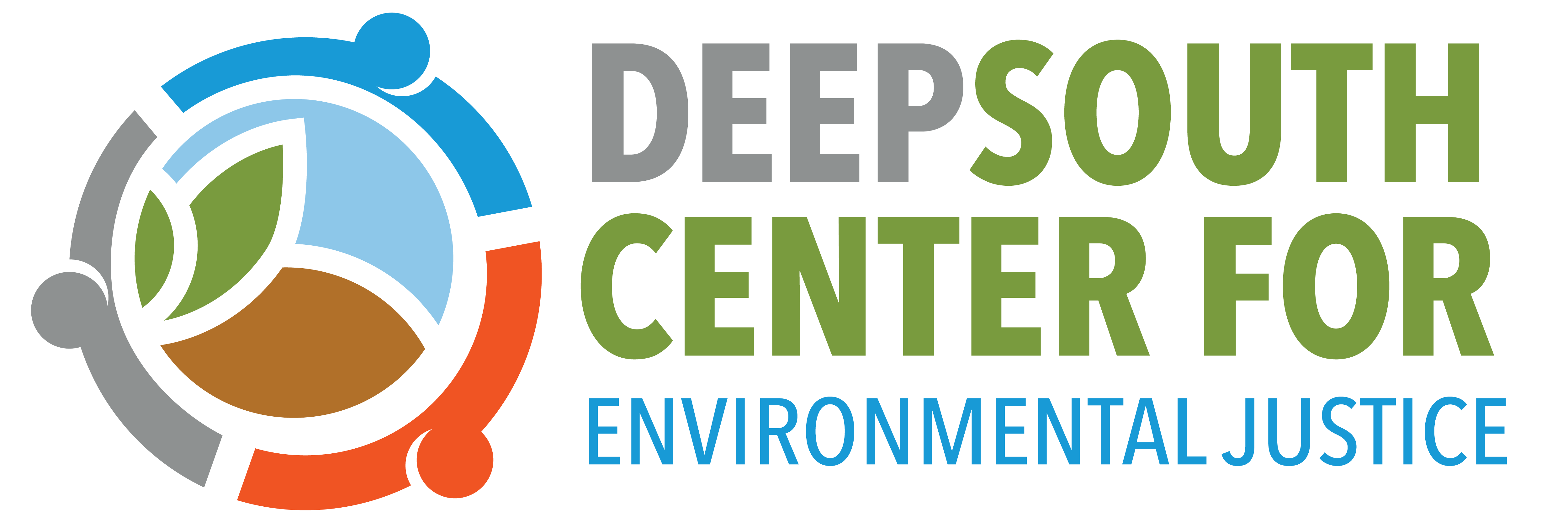
Jun 20, 2023 | Community Engagement News, Dr. Beverly Wright News, DSCEJ General News, Research and Policy News, Take Action Alert
FOR IMMEDIATE RELEASE: June 20, 2023
Dr. Beverly Wright, Environmental Justice Activists, and Community Leaders Will Travel to Baton Rouge to Oppose Approval of Louisiana’s Flawed Application
NEW ORLEANS, LA – On Wednesday, June 21, beginning at 1:00 pm CT, Dr. Beverly Wright of Deep South Center for Environmental Justice (DSCEJ) will travel with environmental justice activists and local community leaders to Baton Rouge, where the US EPA will hold the first of a three-day hearing on its draft approval of the Louisiana Department of Natural Resources’ application for authority to permit the underground injection of carbon dioxide waste.
With a record of failure and mismanagement that resulted in destroying the Bayou Corne community, harming children and adults in Grand Bois, and leaving the state littered with leaking oil and gas wells, the Louisiana Department of Natural Resources (DNR) submitted a flawed application for authority to permit an entirely new category of wells for underground disposal of carbon dioxide, a hazardous substance.
The EPA’s public hearing comes at a time when a new wave of gas-burning facilities are being proposed in Louisiana communities where the majority of residents are Black, Indigenous, and poor. Plans for many of these facilities include carbon capture and storage or CCS – a risky process that involves collecting carbon dioxide from industrial waste streams and transporting it via miles of pipeline to areas targeted for injecting the carbon dioxide underground for disposal.
Last week, the Louisiana legislature attempted to tackle problems in state laws governing carbon dioxide waste injection. One of these laws significantly reduced the time of a company’s liability for operating a carbon dioxide injection well from 50 years, which is required by federal regulations, to 10 years. The recent changes to the state laws trigger another review by the EPA with the opportunity for public notice and comment.
WHAT: EPA public hearing on Louisiana’s application for authority to permit the underground injection of carbon dioxide waste
WHO: Dr. Beverly Wright, Deep South Center for Environmental Justice, environmental justice activists, and community leaders
WHERE: Louisiana Department of Natural Resources, LaBelle Hearing Room, 1st Floor, LaSalle Building, 617 North 3rd Street in Baton Rouge, LA
The event will also be live-streamed HERE.
WHEN: Wednesday, June 21, from 1 pm – 5 pm and 6 pm – 8 pm
###
About the Deep South Center for Environmental Justice
Families in the Gulf Coast deserve to live in communities that are free from deadly air and are more resilient to climate change and extreme weather. The Deep South Center for Environmental Justice (DSCEJ) works to empower and engage communities to put environmental justice and equity at the center of all climate action. Led by environmental justice scholar and advocate, author, civic leader, and professor of Sociology Dr. Beverly L. Wright, the DSCEJ uses research, education, and community and student engagement to advocate for policy change, lead health and safety training for environmental careers, develop social and emotional community wellness programs, and create new and environmentally healthy opportunities for the residents of communities disproportionately impacted by historic environmental injustice.

Mar 25, 2023 | Community Engagement News, Dr. Beverly Wright News, Research and Policy News
FOR IMMEDIATE RELEASE: May 25, 2023
Contact: Ginger LeBlanc | gingerl@dscej.org
New Orleans, LA – In response to today’s Supreme Court’s decision weakening the EPA’s ability to enforce wetland protections, Dr. Beverly Wright, Founding Executive Director of the Deep South Center for Environmental Justice, released the following statement:
“Once again, the U.S. Supreme Court has removed an important protection in our nation. This time the target is wetlands that filter out pollutants from waterways and provide important defenses against major storms and flood events, now supercharged by climate change. In Louisiana and other coastal states, Black and other communities of color are working to preserve and protect their wetlands from projects that entail draining and cementing over them. The Supreme Court has gutted Clean Water Act protections for these wetlands and sets developers loose to destroy them. This decision is an injustice to communities across America where flood risks have been mitigated by wetlands.”
###
About the Deep South Center for Environmental Justice
Families in the Gulf Coast deserve to live in communities that are free from deadly air and are more resilient to climate change and extreme weather. The Deep South Center for Environmental Justice (DSCEJ) works to empower and engage communities to put environmental justice and equity at the center of all climate action. Led by environmental justice scholar and advocate, author, civic leader and professor of Sociology Dr. Beverly L. Wright, the DSCEJ uses research, education, and community and student engagement to advocate for policy change, lead health and safety training for environmental careers, develop social and emotional community wellness programs, and create new and environmentally healthy opportunities for the residents of communities disproportionately impacted by historic environmental injustice.

Dec 2, 2022 | Community Engagement News, DSCEJ General News, The Latest News
Four New Orleans high school students participating in the Deep South Center for Environmental Justice’s (DSCEJ) Environmental and Climate Justice Storyteller (ECJS) internship program completed a tour of Cancer Alley, an 85-mile stretch of land along the Mississippi River between Baton Rouge and New Orleans that is home to over 150 petrochemical plants and refineries. ECJS Interns, Langston Bishop, St. Augustine High School, Lael Tolbert, Mount Carmel High School, Re’Kal Hooker, The Living School, and Victoria Cager, New Orleans Center for Creative Arts met with community leaders throughout the corridor to learn more about the environmental injustices that have been occurring for decades in their own backyard.
Concerned Citizens of Gordon Plaza
New Orleans, LA
The students kicked off the Cancer Alley Tour in in the Gordon Plaza Community of New Orleans, LA, which sits on top of a municipal landfill. For forty years, residents in Gordon Plaza have complained of exposure to toxic waste in their yards, pipes corroding underneath their homes, and high rates of cancer in their community. Re’Kal Hooker interviewed community leader Shannon Rainey about her experience living in Gordon Plaza. Ms. Rainey spoke about the challenges she has experienced living in her community, such as seeing friends and neighbors succumb to cancer due to exposure to toxins in the soil. Although residents in this community have spent years in court fighting for relocation, many are hopeful that things may be different this time. Ms. Rainey said that “they are currently negotiating with the City of New Orleans for a fully funded relocation of residents living in Gordon Plaza.” She is hopeful and looks forward to a victory for the Gordon Plaza Community soon.
The next stop on the Cancer Alley Tour was St. John The Baptist Parish in Reserve, LA, where the students met with community leader and President of Concerned Citizens of St. John the Baptist Parish Robert Taylor. During his interview conducted by Langston Bishop, we learned that Mr. Taylor started Concerned Citizens of St. John the Baptist Parish in 2016 after his wife became ill from exposure to toxic chemicals coming from the nearby Denka/Dupont Plant.
“The odors from the plant caused my wife to become extremely ill,” said Mr. Taylor. “After this incident, I reached out to the Environmental Protection Agency, Louisiana Department of Environmental Quality, and St. John Parish Homeland Security. I also reached out to local representatives from St. John the Baptist Parish and the local school board for help. The Fifth Ward Elementary School is only 1500 feet from Denka/Dupont.”
Mr. Taylor shared with Bishop that “Denka emits chloroprene levels over 400 times the Environmental Protection Agency safety standard for long term exposure,” which is why “it’s hard to find a family in Reserve, LA who hasn’t been touched by cancer.”
As a senior in his 80’s, Mr. Taylor’s advice to the next generation is to continue the fight for environmental justice with great allies.
“Unity is the key to fighting industry,” he said.
Rise St. James
St. James Parish
The final stop was in St. James Parish, where Victoria Cager had the distinct honor of interviewing Sharon Lavigne, the 2021 Goldman Environmental Award recipient and President of Rise St. James. In 2018, Ms. Sharon Lavigne smelled odors in the air and began work with the Help Association. Over the last four years, Rise St. James has prevented plants from coming to St. James Parish.
Ms. Lavigne said, “the local officials don’t represent the community, they represent the industries. They have let us down.” Rise St. James has hosted town hall meetings and distributed flyers to raise awareness about plants coming into their community. Unfortunately, residential homes, the sugar mill, and St. James High School were sold to industry.
There are twelve plants on the West Bank and seven plants on the East Bank of St. James Parish. Additionally, Lavigne built storage plants next to homes in the community. As a result of the long-term exposure to toxic chemicals and high cancer rate in her community, Ms. Lavigne encourages the next generation to get their education and do their research so that they can come back to St. James Parish with ways to help their community. She would also like the federal government to declare a public health emergency in St. James Parish.
ECJS Interns look forward to continuing their work with these communities as they develop creative ways to chronicle their story as they demand the right to clean air, water, and soil for all.
About the Environmental and Climate Justice Storyteller Internship program
ECJS is a program funded by the National Academy of Sciences, Engineering and Medicine (NASEM). The $1.25 million, five-year grant awarded to the Deep South Center for Environmental Justice (DSCEJ) is dedicated to equipping the next generation of environmental and climate justice leaders with the technical skills to chronical the stories of marginalized communities along the Gulf Coast Region in LA, FL, MS, AL, and TX.
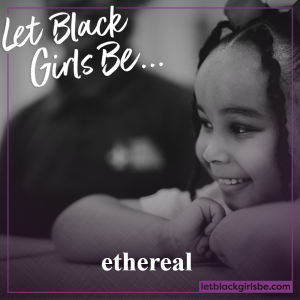
Jul 15, 2022 | Community Engagement News, DSCEJ General News, The Latest News
The pioneering Collaborative for African-American Girls and Women presents, “Let Black Girls Be…”to inspire and empower the community to nurture and protect black girlhood.
New Orleans—The Collaborative for African-American Girls and Women (CAAGW), a powerhouse team of Black women leading organizations that serve Black girls in the city of New Orleans, unveils “Let Black Girls Be…”, a new campaign created by Navigate NOLA. The social marketing campaign aims to dismantle racist and sexist attitudes towards black girls that give rise to disparities across the systems with which black girls interface. The campaign’s call to action is unique in that it positions behavior change as the product being marketed, calling on the community at large to shift historically negative attitudes towards black girls and black women to celebrating black girls and extending the same grace to black girls that is extended to their white counterparts throughout girlhood.
The campaign features billboards, located throughout the city of New Orleans, of black and white portraits of black girls, captured by documentary photographer Nina Robinson. The community at large is encouraged to participate in the campaign by visiting the campaign website, www.letblackgirlsbe.com, to create their own images, celebrating black women and black girls, and posting them to social media.
CAAGW is a consortium comprised of community-based organizations/projects that support African-American girls in the city of New Orleans. CAAGW works to address the ascending disparities in education, health, and economics that African-American girls face. CAAGW utilizes a collective impact framework to evaluate the impact of programming across the partnering organizations that serve African-American girls in the city of New Orleans. CAAGW leads small-scale research initiatives to examine the experiences of African American girls and young women that can be brought to scale to better support a landscape that advances equity for African-American girls and women. CAAGW is comprised of the following organizations: 1.) Navigate NOLA, 2.) Project Butterfly New Orleans, 3.) The Orchid Society, 4.) Daughters Beyond Incarceration and 5.) The Beautiful Foundation.
CAAGW members, Dr. Danielle Wright and Dr. Rashida Govan, as part of this campaign, co-authored a book chapter, elevating the collective power of black women working with black girls, and the expected publishing date of the book is Fall 2022.
This summer, CAAGW will release a collective impact report, demonstrating the collective power of the collaborating organizations and their work, led by black women and centered on the experiences of black girls.
The “Let Black Girls Be…” campaign continues to provide educators, school-based mental health professionals, and youth-serving community-based organizations with training and professional development that seek to expand their capacity to meet the unique needs of black girls, and to shift schools and communities to spaces of healing for black girls.
For more information, please contact:
Dr. Danielle Wright
Navigate NOLA
Danielle.wright@navigatenola.com
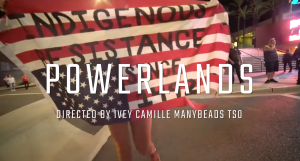
May 5, 2022 | Community Engagement News, DSCEJ General News, The Latest News
The Southern Premiere of Powerlands, featuring a post-screening discussion w/ local organizers & the filmmaker.
About this event
Presented by Deep South Center for Environmental Justice and PATOIS Film Collective: Powerlands, a new film about Indigenous Rights and Environmental Justice. Screening and Benefit, Wednesday, May 18, 6:30pm, at the Broad Theater. Featuring a post-screening discussion with:
- Shannon Rainey, President of Residents of Gordon Plaza
- Donny Verdin, Vice Principle Chief, United Houma Nation
- Powerlands Director Ivey Camille Manybeads Tso
Tickets: $10
All proceeds from this event will be equally shared with the United Houma Nation & the Residents of Gordon Plaza.
ABOUT POWERLANDS
A young Navajo filmmaker investigates displacement of Indigenous people and devastation of the environment caused by the same chemical companies that have exploited the land where she was born. On this personal and political journey she learns from Indigenous activists across three continents. Powerlands is the winner of best film at 2022 American Documentary Film Festival (AmDocs). This screening is the US Southern Premiere.
ABOUT IVEY CAMILLE MANYBEADS TSO
Ivey Camille Manybeads Tso is an award-winning queer Navajo filmmaker, and a recent fellow with the Firelight Media Documentary Filmmaker Lab. She started making films at the age of 9, through the Native youth media project Outta Your Backpack Media. At the age of 13 she made the award-winning fiction film In the Footsteps of Yellow Woman, based in the true story of her great-great-great grandmother Yellow Woman, who lived through the Navajo Long Walk of 1864-1868. The film screened in over 90 film festivals internationally and won 11 awards. Ivey Camille continued to refine her filmmaking craft with a full scholarship to Idyllwild Arts Academy in California. She later returned home to work on films in her community of Navajo Nation. At the age of 19, Ivey Camille began work on Powerlands, her first feature.
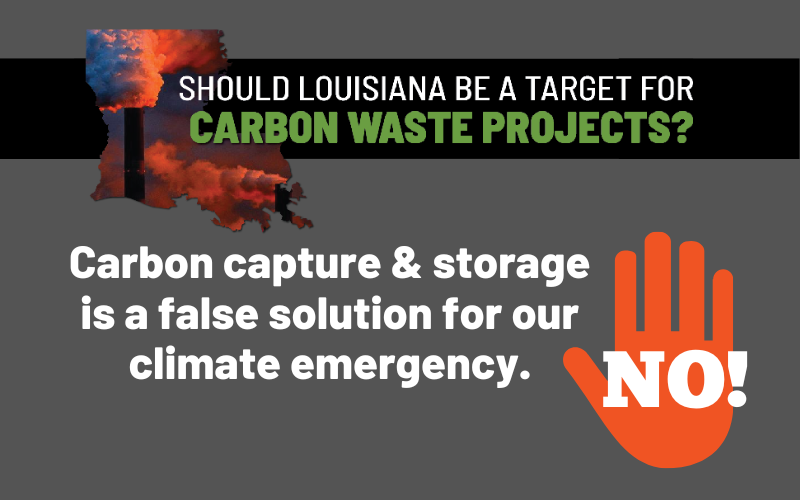
Mar 10, 2022 | Community Engagement News, DSCEJ General News, Research and Policy News, The Latest News
MISSED THE WEBINAR?
Oil and gas companies are targeting Louisiana for the underground disposal of millions of tons of industrial carbon waste.
In this webinar, legal experts pull back the cover of so-called “carbon capture and storage” to present the wide range of safety, health and environmental risks for Louisiana communities. They share their insights on relevant laws and policies, and discuss the actions people can take.
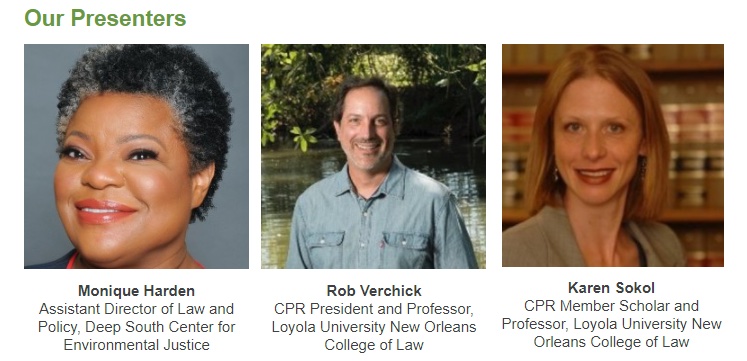
LEARN MORE

